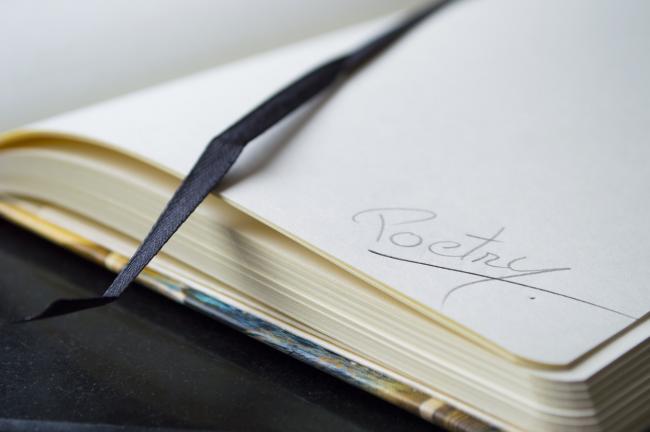Polish poet fosters creativity at Oxford Spires Academy

As part of the Prismatic Translation strand of the Creative Multilingualism research project, a partnership has been established with the Poetry Hub at Oxford Spires Academy. Through the Hub, students whose first language may not be English are able to develop their creative writing skills and are provided with an arena for self-expression. Following the success of the Arabic poetry-writing workshop in December 2017, a second workshop was held in April 2017. This time, Polish poet Wioletta Greg worked with Polish-speaking students to foster their creativity and explore themes of identity and bilingualism.
All the workshop participants had been born in Poland and come to the UK between the ages of five and ten. The first group were aged between 11 and 14, while those in the second were all aged 15. A roughly equal number of boys and girls took part but it was interesting to note that when the second group were asked if they would make an effort to speak Polish to their own children, all the girls said yes, while the boys didn’t feel this was particularly important. Most of the children said they had not known the others before the workshop and found it odd to speak Polish to each other. Even those who had only moved to the UK a few years previously said they felt more at home in English and the UK than in Polish and Poland. Most said they dreamt in English.
The workshops began with Wioletta reading a poem in Polish, written shortly after she moved to the UK, about an encounter with a fox which provoked her to exclaim “fox!” in English and led on to a discussion of the etymology of the Polish for fox, lis. She also read an anonymous poem translated from Sanskrit into Polish, about an Eskimo reflecting on the interchangeability between men and animals. The children were then asked to write a poem in Polish and/or English about which animal they would like to become and why. Jan, aged 13, wrote that he would like to become a bird so that he could see the world from above – the best perspective in his opinion – while 12-year old Amalia wanted to be a cat because of its independent nature. In the second part of the workshops the children were challenged to write poems in response to meeting someone from another planet, introducing themselves and explaining something about our way of life. In this case, most of the children wrote in Polish although two wrote bilingual Polish-English poems and Patryk, 15, used Polish words with English syntax and performed a poem written by Aleksandra, 15, as a rap. Following this, a game was played whereby Wioletta asked the children to write questions they would ask an oracle and then randomly select a number, after which she read the first line of the poem found on that page of a particular book of poetry, which supposedly provided the answer to their question, to hilarious effect. When asked to imagine that the world was going to end and they had to leave a message for the new civilisation that would replace it, one boy said there was no point in writing in Polish as any new civilisation certainly wouldn’t speak Polish!
The workshop was attended by researchers from Prismatic Translation as well as two bilingual members of the University of Oxford, who were on hand to translate where necessary.
Karolina Watroba, a DPhil candidate in Medieval and Modern Languages said:
I was aware of the work of the Poetry Hub at Oxford Spires Academy, so I was thrilled to be asked to help out at a Polish poetry workshop there. What made it even more special was that Wioletta Greg, a Polish-born poet, now based in the UK, who led the workshop, had been longlisted for the Man Booker International Prize just a few weeks before. I moved to the UK from Poland at the age of 19 to study at Oxford and was curious to compare my experiences with those of children who had come here at a much younger age. I was quite surprised to discover that they all spoke English with no accent and didn't even speak Polish amongst themselves. And yet, once confronted with Polish poetry, the children responded with Polish poems of their own, some of them unexpectedly mature and beautifully crafted. It was fascinating and moving to witness their sudden realisation that Polish could be a viable and valuable medium of creative expression, and not just a hidden, superfluous or even vaguely embarrassing language that's never spoken or heard in a classroom.
Kasia Szymanska, a Junior Research Fellow in Slavonic languages, had the following to say about the workshop:
I think the pupils thoroughly enjoyed all the creative exercises Wioletta Greg suggested; ranging from themed-poetry writing sessions, to questions about the nature and role of poetry today. It was particularly intriguing to see how the children quickly became immersed in Polish as a literary language and were able to write very inventive poetry. Some of them even tried to use both languages, which created a very unique effect. I really hope that now they have been introduced to the artistic potential of their mother tongue, they will be able to embrace their bilingualism more consciously in the future. I think the Poetry Hub team are doing a great job of addressing the urgent and important issue of language development and national identity amongst these and other bilingual children. In the case of Polish, although it was the second most-reported main language spoken at home in the 2011 UK census (after English), it is barely visible in the public sphere.
Rachel Dryden is a researcher on our 6th strand: Prismatic Translation.
Where next?
Mapping translation – on the trail of Jane Eyre